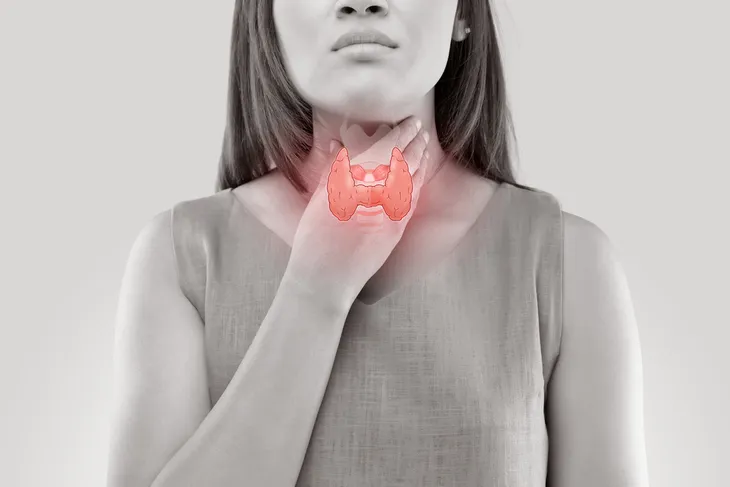Your thyroid is a truly incredible thing. It uses iodine to make and store the critically important hormones that your body requires to regulate your heart rate, blood pressure, body temperature, and even your metabolism.
It’s also prone to problems. Hypothyroidism, or an underactive thyroid, can make even the most mundane activities seem insurmountable. All the more reason to eliminate as many thyroid-harming habits as soon as you can. So, what can you do today in the name of thyroid health? Let’s take a look at some of the poor lifestyle habits that have the potential to wreak havoc on your poor thyroid.
Inactivity
The perils of leading an inactive, sedentary lifestyle increase as you get older. Injuries get worse, life gets busier, and the calendar keeps on moving.
Even worse, inactivity leads to weight gain, which compounds the problem and can even lead to hypothyroidism. Go for a walk, play golf, or throw a ball around with your kids. The best time to start integrating exercise into your life was yesterday. But the second-best time is today.

Stress
More and more, science is getting a better understanding of the real, physiological toll that living a stressful life can take on the human body. Physically stressful events can trigger something called a thyroid storm, which though rare, can be life-threatening.
Emotional stress can wreak havoc on your endocrine system too, which is why de-stressing is so crucial. If you don’t know how to de-stress, try new things, and experiment with proven strategies until you find something that works for you.

Smoking
If you haven’t heard enough bad things about smoking to encourage you to quit, hear this: smoking is bad for your thyroid. Tobacco smoke has been clinically proven to inhibit hormone production, absorption of iodine into the thyroid gland, and increase the excretion of iodine from the kidneys.
It doesn’t take a scientist to understand that all of these things are bad for your thyroid and your overall health. If you need help quitting, reach out to your doctor. Support groups may also help.

Alcohol
Just like smoking, excessive alcohol use impacts all areas of your body. Though few studies have been done on how casual drinking can affect the thyroid, much is known about those who drink excessively. And it’s not good news either.
Heavy alcohol use has been shown to reduce thyroid hormones, as well as blunt the response of thyroid-stimulating hormones. If you want your thyroid to do its job properly, settle up with the barkeep and head home.

Not Enough Sleep
It’s generally understood that people with hypothyroidism don’t get enough sleep, or the sleep that they do get isn’t good quality. By not allowing their body to fully recover, they’re putting a strain on their thyroid, and it’s struggling to keep up.
Getting better sleep is about developing a healthy routine and carving out space for a full 8-hours of rest per night. It’s not impossible if you make it a priority. And the research suggests that you most definitely should make sleep a priority.

Improper Use of Medication
If you are one of the millions of Americans suffering from hypothyroidism, you’ll want to be sure that you’re taking your medications properly. Don’t miss taking it, don’t mix brands, don’t travel without it, and be sure that you’re following all of the instructions on the bottle precisely.
Many who suffer from hypothyroidism can’t make enough thyroid hormone on their own. All the more reason to be diligent with your doctor prescribed medications.

The Takeaway
Your thyroid is an absolute workhorse, but it needs more than a little bit of help from its owner in order to work effectively. Stop smoking, move more, develop ways to de-stress every single day, and put a premium on getting a full 8-hours of sleep.
Easier said than done, we’re sure. But know that avoiding the many poor habits associated with the development of hypothyroidism will also provide you with more energy to enjoy all of the wonderful things that your life has to offer.

Common Signs of an Underactive Thyroid (Hypothyroidism)
Now that you have an understanding of the poor habits that can harm your thyroid and what you can do to support it, it’s important that you know the signs of an underactive thyroid. This will help you be on the lookout for hypothyroidism so you can get the right treatment if it does happen to you.
Mayo Clinic points out that symptoms are usually barely noticeable in the beginning. You may begin experiencing fatigue and weight gain which can be commonly mistaken for getting older.
Other common signs of hypothyroidism are dry skin, constipation, increased sensitivity to cold, and muscle weakness or stiffness. You may also experience thinning hair, irregular menstrual periods, slowed heart rate, depression, impaired memory, or an enlarged thyroid gland (known as goiter).

Risk Factors
Hypothyroidism most often occurs in middle-aged and older women, however, anyone can develop it. Certain factors can increase your risk too.
Some risk factors for hypothyroidism include having a family history, having an autoimmune disease (such as type 1 diabetes), being pregnant, or if you delivered a baby within the last 6-months. Taking certain medications, radiation treatments specifically to your neck or upper chest, or thyroid surgery can also increase your risk.

When to See a Doctor
If you start feeling abnormally tired for no reason, or if you begin to show any other signs of hypothyroidism, you should book an appointment with your doctor. They’ll be able to determine if you have an underactive thyroid.
After confirming a diagnosis your doctor will be able to determine the right course of treatment.
Complications
Leaving hypothyroidism untreated can lead to a variety of complications. One of them being goiter, which is an enlarged thyroid gland. While it isn’t usually dangerous, it can affect your appearance and make certain functions like swallowing difficult.
Other complications of leaving hypothyroidism untreated include an increased risk for mental health problems (such as depression), heart problems (such as heart disease), peripheral neuropathy, infertility, and birth defects. Long-term, undiagnosed hypothyroidism can also lead to a life-threatening condition known as myxedema.

Treatment
The good news is hypothyroidism can usually be treated with synthetic thyroid hormone treatments. This is an oral medication that aims to restore your hormone levels. To find the right dosage, you’ll need to have regular blood tests.
As the treatment begins to work, your symptoms will start to subside and you’ll gradually feel better. Mayo Clinic also points out, “Treatment with levothyroxine will likely be lifelong, but because the dosage you need may change, your doctor is likely to check your TSH level every year.”

